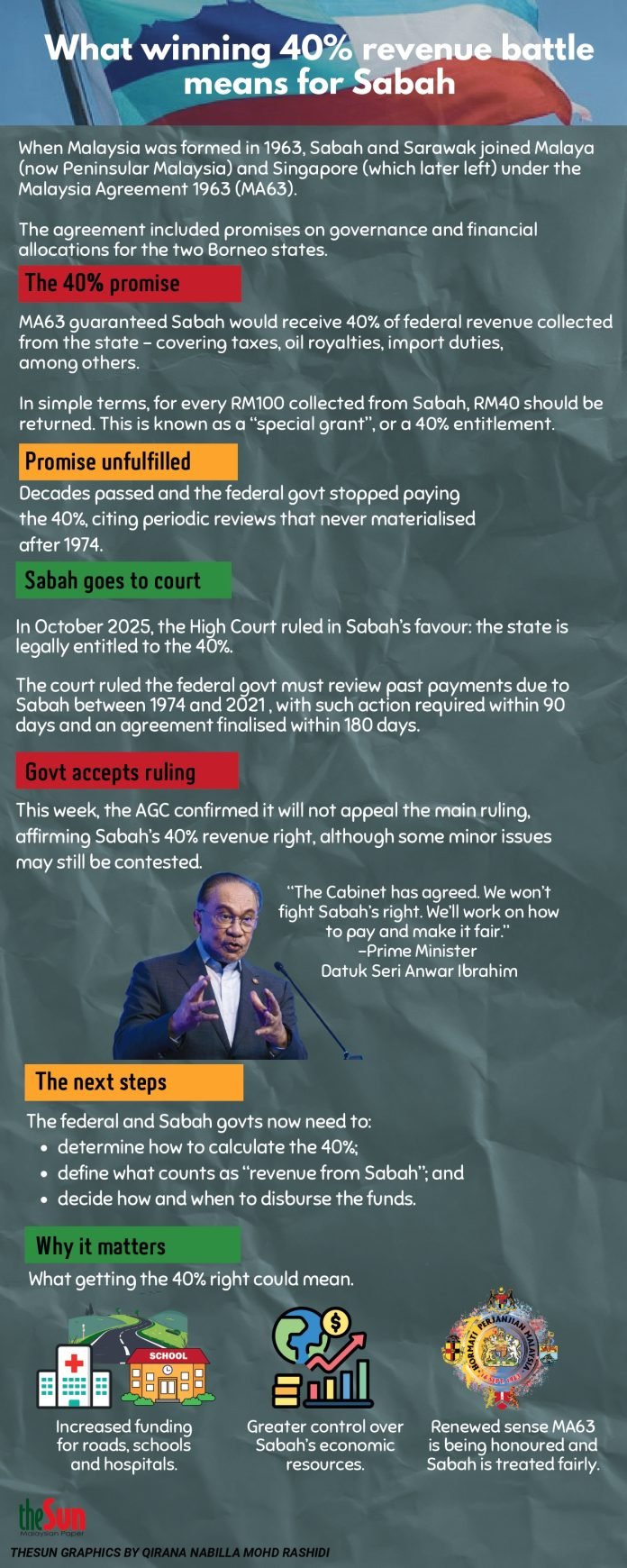Analysts say objecting to only certain parts of High Court judgment on 40% grant reflects legal prudence, political strategy
PETALING JAYA: The federal government’s decision not to appeal the Kota Kinabalu High Court ruling affirming Sabah’s constitutional right to 40% of federal revenue collected from the state and to only appeal certain parts of it reflects both legal prudence and political strategy, say analysts.
Nusantara Academy of Strategic Research senior fellow Prof Dr Azmi Hassan said the 40% entitlement is enshrined in the Constitution, with the government’s non-appeal focusing specifically on the claim that both federal and state authorities acted improperly between 1974 and 2022.
“Yes, Sabah’s 40% entitlement is not in question. The government will not challenge it because it is part of the Constitution.
“However, the court’s written ruling stated that between 1974 and 2022, both the federal and Sabah governments were at fault due to the lack of audits.”
Azmi said the five-year audits required under the Constitution were never conducted, prompting the court to rule that both federal and state authorities failed in their duties.
“The government’s challenge is not about denying Sabah’s right but correcting the record to show that the federal government fulfilled its obligations and that audits, not entitlement, are the real issue.”
Azmi said further audit findings would determine what the federal government owes Sabah for the 1974–2022 period.
He warned that a ruling in Sabah’s favour could open the door for other states to seek overdue payments.
“If the government was wrong in payments to Sabah or other states, each state could pursue similar claims. This could have major repercussions for federal-state fiscal relations.”
He added that the key question now is the quantum of payment.
“The ‘lost years’ are being paid to Sabah using the 1974 quantum without review until 2022.”
Universiti Kebangsaan Malaysia political analyst Prof Dr Novel Lyndon described the government’s decision as a significant constitutional and political advancement that reinforces Malaysia’s cooperative federalism.
“By recognising Sabah’s right to a fair fiscal share, the federal government affirms its commitment to legal responsibilities under Articles 112C and 112D of the Constitution and the Malaysia Agreement 1963 (MA63), while addressing long-standing issues of regional fairness and autonomy.”
He said the strategy to focus on the reasoning rather than the substantive conclusions reflects a prudent legal approach.
“It respects the High Court’s recognition of Sabah’s rights while ensuring that the rationale is carefully examined for accuracy and doctrinal validity.”
Novel said the High Court’s remarks on alleged unlawful actions by federal and state authorities since 1974 exposed structural weaknesses in intergovernmental fiscal system.
“Recognising these administrative shortcomings is essential for restoring accountability and legitimacy regarding constitutional guarantees.”
He said the Treasury secretary-general’s swift order to begin talks with Sabah’s state secretary shows that bureaucratic delays must not obstruct constitutional rights.
He said the decision underscores that some constitutional duties must continue regardless of political transitions. “The challenge will be ensuring that negotiations yield concrete, equitable outcomes for Sabah while preserving unity within Malaysia’s constitutional framework.”








